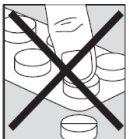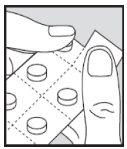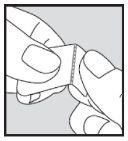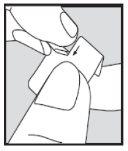
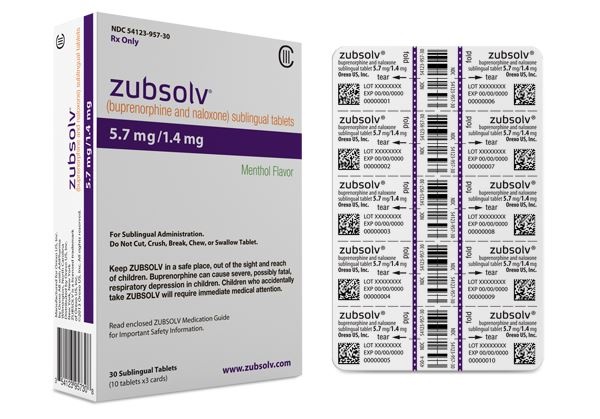
ZUBSOLV 5,7 mg/1,4 mg COMPRIMIDOS SUBLINGUAIS

Pergunte a um médico sobre a prescrição de ZUBSOLV 5,7 mg/1,4 mg COMPRIMIDOS SUBLINGUAIS

Como usar ZUBSOLV 5,7 mg/1,4 mg COMPRIMIDOS SUBLINGUAIS
Introdução
Prospecto: informação para o paciente
Zubsolv 0,7 mg / 0,18 mg comprimidos sublinguais
Zubsolv 1,4 mg / 0,36 mg comprimidos sublinguais
Zubsolv 2,9 mg / 0,71 mg comprimidos sublinguais
Zubsolv 5,7 mg / 1,4 mg comprimidos sublinguais
Zubsolv 8,6 mg / 2,1 mg comprimidos sublinguais
Zubsolv 11,4 mg / 2,9 mg comprimidos sublinguais
buprenorfina/naloxona
Leia todo o prospecto detenidamente antes de começar a tomar este medicamento, porque contém informações importantes para si.
- Conserva este prospecto, porque pode ter que voltar a lê-lo.
- Se tiver alguma dúvida, consulte o seu médico ou farmacêutico.
- Este medicamento foi prescrito apenas para si, e não deve dá-lo a outras pessoas, mesmo que tenham os mesmos sintomas que si, porque pode prejudicá-las.
- Se experimentar efeitos adversos, consulte o seu médico ou farmacêutico, mesmo que se trate de efeitos adversos que não aparecem neste prospecto. Ver seção 4.
Conteúdo do prospecto
- O que é Zubsolv e para que é utilizado
- O que precisa saber antes de começar a tomar Zubsolv
- Como tomar Zubsolv
- Posíveis efeitos adversos
- Conservação de Zubsolv
- Conteúdo do envase e informação adicional
1. O que é Zubsolv e para que é utilizado
Zubsolv contém os princípios ativos buprenorfina e naloxona. Zubsolv é utilizado para tratar a dependência de opioides (narcóticos), como a heroína ou a morfina, em drogadictos que aceitaram receber tratamento para a sua adicção. Zubsolv é utilizado em adultos e adolescentes com mais de 15 anos de idade, que também estejam a receber apoio médico, social e psicológico.
Como actua Zubsolv?
O comprimido contém buprenorfina que é responsável pelo tratamento da dependência de opioides (narcóticos). Também contém naloxona que é utilizada para dificultar o uso indevido do medicamento por via intravenosa.
2. O que precisa saber antes de começar a tomar
Zubsolv Não tome Zubsolv :
- se é alérgico à buprenorfina, à naloxona ou a algum dos outros componentes deste medicamento (incluídos na seção 6)
- se tem problemas respiratórios graves
- se tem problemas de fígado graves
- se tem uma intoxicação por álcool ou tem tremores, suor, ansiedade, confusão ou alucinações provocados pelo álcool
- se está a tomar naltrexona ou nalmefeno para o tratamento da dependência do álcool ou dos opioides
Advertências e precauções
- Uso indevido, abuso e desvio
Podem ocorrer casos graves de infecções com um resultado potencialmente mortal se for feito um uso indevido de Zubsolv, administrando-o por via intravenosa.
Este medicamento pode ser um alvo para as pessoas que abusam de medicamentos com receita, e deve ser conservado num local seguro para protegê-lo contra o roubo (ver seção 5). Não dê este medicamento a ninguém mais. Pode causar-lhes a morte ou algum outro dano.
- Problemas respiratórios(ver também “Não tome Zubsolv” mais acima)
Algumas pessoas morreram por insuficiência respiratória (incapacidade para respirar) porque fizeram um uso indevido deste medicamento ou o tomaram em combinação com outros depressores do sistema nervoso central, como o álcool, as benzodiazepinas (tranquilizantes) ou outros opioides.
O medicamento deve ser utilizado com precaução em pacientes com problemas respiratórios prévios
Este medicamento pode provocar depressão respiratória (dificuldade para respirar) grave, e potencialmente mortal, em crianças e em pessoas não dependentes de opioides se o ingerirem de forma acidental ou intencional.
- Sonolência
Este medicamento pode provocar sonolência, especialmente quando é tomado junto com álcool ou outros depressores do sistema nervoso central (como tranquilizantes, sedantes ou hipnóticos).
- Dependência
Este medicamento pode causar dependência.
- Dano no fígado
Foi notificado dano no fígado após tomar buprenorfina/naloxona, especialmente quando é feito um uso indevido do medicamento. Isso também poderia dever-se a infecções víricas (hepatite C crónica), abuso do álcool, anorexia ou uso de outros medicamentos que podem danificar o fígado (ver seção 4). O seu médico pode realizar-lhe análises de sangue com regularidade para controlar o estado do seu fígado.
Informar o seu médico se tem problemas de fígado antes de iniciar o tratamento com Zubsolv.
- Sintomas de abstinência
Este medicamento pode provocar sintomas de abstinência se o tomar menos de seis horas após ter consumido um opioide de ação curta (p. ex. morfina, heroína) ou menos de 24 horas após ter consumido um opioide de ação prolongada, como a metadona.
Zubsolv também pode causar sintomas de abstinência se deixar de o tomar bruscamente.
- Tensão arterial
Este medicamento pode provocar um descenso súbito da sua tensão arterial, o que provocaria uma sensação de tontura se se levantasse demasiado rápido quando está sentado ou deitado.
- Crianças e adolescentes
Pode estar sob uma supervisão mais estreita por parte do seu médico se tiver menos de 18 anos de idade.
As pessoas com menos de 15 anos não devem tomar este medicamento.
- Diagnóstico de afecções médicas não relacionadas
Este medicamento pode mascarar sintomas de dor que poderiam ajudar no diagnóstico de algumas doenças. Não se esqueça de informar o seu médico se tomar este medicamento.
Consulte o seu médico antes de começar a tomar Zubsolvse:
- tem depressão ou outras doenças que se tratam com antidepressivos.
O uso desses medicamentos junto com Zubsolv pode provocar síndrome serotoninérgica, uma doença potencialmente mortal (ver «Toma de Zubsolv com outros medicamentos»)
- tem problemas de rim
- sofreu recentemente uma lesão na cabeça ou uma doença no cérebro
- tem a tensão arterial baixa, aumento do tamanho da próstata, ou dificuldades para urinar devido a um estreitamento da uretra
- tem pouca atividade da glândula tireoide, o que pode provocar cansaço ou aumento de peso
- sua glândula suprarrenal não funciona bem (p. ex. doença de Addison)
- tem problemas nas vias biliares (p. ex. vesícula biliar, conduto colédoco)
- é uma pessoa de idade avançada
- está debilitado
Toma de Zubsolv com outros medicamentos
Informar o seu médico se está a utilizar, utilizou recentemente ou pudesse ter que utilizar qualquer outro medicamento.
Alguns medicamentos podem aumentar os efeitos adversos de Zubsolv e, em alguns casos, podem causar reações muito graves. Não tome outros medicamentos enquanto estiver a tomar Zubsolv sem falar primeiro com o seu médico, especialmente:
- antidepressivos como moclobemida, tranilcipromina, citalopram, escitalopram, fluoxetina,fluvoxamina, paroxetina, sertralina, duloxetina, venlafaxina, amitriptilina, doxepina ou trimipramina. Estes medicamentos podem interagir com Zubsolv e pode experimentar sintomas como contrações musculares rítmicas involuntárias, incluídos os músculos que controlam o movimento dos olhos, agitação, alucinações, coma, suor excessivo, tremores, exageração dos reflexos, aumento da tensão muscular, temperatura corporal superior a 38 °C. Entre em contacto com o seu médico se sofrer estes sintomas.
- Naltrexona e nalmefeno(fármacos utilizados para tratar transtornos adictivos) porque podem impedir os efeitos terapêuticos de Zubsolv. Não devem ser tomados ao mesmo tempo que o tratamento com Zubsolv, porque pode experimentar um início repentino de uma abstinência intensa e prolongada.
- Benzodiazepinas(utilizadas para tratar a ansiedade ou os transtornos do sono) como diazepam, temazepam, alprazolam. O seu médico indicará a dose correcta para si. Tomar dosesincorrectas de benzodiazepinas pode provocar a morte por insuficiência respiratória (incapacidade para respirar).
- Outros medicamentos que podem fazer com que sinta sonoutilizados para tratar doenças como a ansiedade, o insónio, as convulsões ou crises epilépticas, a dor e outros transtornos mentais. Este tipo de medicamentos reduz os seus níveis de alerta, tornando perigoso para si conduzir e utilizar máquinas. Também podem provocar depressão do sistema nervoso central, que é muito grave. A seguir, inclui-se uma lista com exemplos deste tipo de medicamentos:
- outros medicamentos que contenham opioides como a metadona, certos analgésicos e antitussígenos
- alguns antidepressivos (utilizados para tratar a depressão) como isocarboxazida, fenelzina, selegilina, tranilcipromina, valproato e os inibidores das monoaminooxidases (IMAO) porque podem aumentar os efeitos deste medicamento
- antagonistas do receptor H1 que produzem sonolência (utilizados para tratar reacções alérgicas) como difenhidramina e clorfenamina
- barbitúricos (utilizados para provocar o sono ou a sedação) como fenobarbital, secobarbital
- tranquilizantes (utilizados para provocar o sono ou a sedação) como hidrato de cloral
- clonidina (utilizada para tratar a hipertensão arterial) e medicamentos relacionados porque podem prolongar os efeitos deste medicamento
- antirretrovirais (utilizados para tratar o VIH) como ritonavir, nelfinavir, indinavir, porque podem aumentar os efeitos deste medicamento
- alguns fármacos antifúngicos (utilizados para tratar infecções por fungos) como ketoconazol, itraconazol e certos antibióticos, porque podem prolongar os efeitos deste medicamento
- alguns medicamentos podem diminuir o efeito de Zubsolv. Estes incluem medicamentos que se utilizam para tratar a epilepsia (como carbamazepina e fenitoína) e medicamentos que se utilizam para tratar a tuberculose (rifampicina)
Uso de Zubsolv com alimentos, bebidas e álcool
O álcool pode aumentar a sonolência e pode incrementar o risco de insuficiência respiratória se for tomado com Zubsolv. Não tome Zubsolv junto com álcool.Não engula ou ingira alimentos ou bebidas até que o comprimido se tenha dissolvido por completo.
Gravidez e lactação
Não se conhecem os riscos de usar Zubsolv em mulheres grávidas. Informe o seu médico se está grávida ou tem intenção de ficar grávida. O seu médico decidirá se deve continuar o tratamento com um medicamento alternativo.
Quando são tomados durante a gravidez, especialmente no final da gravidez, os medicamentos como Zubsolv podem causar sintomas de abstinência, incluindo problemas respiratórios, no seu bebé recém-nascido. Isso pode aparecer vários dias após o nascimento.
Não dê o peito enquanto estiver a tomar este medicamento, porque Zubsolv passa para o leite materno.
Pergunte ao seu médico ou farmacêutico antes de tomar qualquer medicamento.
Condução e uso de máquinas
Zubsolv pode provocar sonolência, tontura ou alteração do pensamento. Isso pode ocorrer com mais frequência nas primeiras semanas de tratamento, quando a dose está a ser ajustada, mas também pode ocorrer se beber álcool ou tomar outros medicamentos sedantes ao mesmo tempo que toma Zubsolv. Não conduza, utilize ferramentas ou máquinas, ou realize actividades perigosas, até que saiba como lhe afecta este medicamento.
Zubsolv contém sódio
Este medicamento contém menos de 1 mmol de sódio (23 mg) por dose; isto é, é essencialmente “exento de sódio”.
3. Como tomar Zubsolv
O seu tratamento está prescrito e supervisionado por médicos com experiência no tratamento da drogadição.
O seu médico determinará qual é a melhor dose para si. Durante o tratamento, o médico pode ajustar a dose, em função da sua resposta.
Siga exactamente as instruções de administração deste medicamento indicadas pelo seu médico ou farmacêutico. Em caso de dúvida, consulte o seu médico ou farmacêutico.
Início do tratamento
A dose de início recomendada em adultos e adolescentes maiores de 15 anos é:
- um comprimido de Zubsolv 1,4 mg / 0,36 mg cada dia, ou
- um comprimido de Zubsolv 2,9 mg / 0,71 mg cada dia
Pode ser administrado um comprimido adicional de Zubsolv 1,4 mg / 0,36 mg ou 2,9 mg/ 0,71 mg no dia 1, em função das suas necessidades.
Há outras concentrações disponíveis para o uso por parte do seu médico, que decidirá qual é o melhor tratamento para si. Isso pode implicar tomar uma combinação de diferentes concentrações, mas a sua dose diária não deve exceder 17,2 mg de buprenorfina.
Os sinais claros de abstinência devem ser evidentes antes de tomar a sua primeira dose de Zubsolv. A avaliação por parte do seu médico de se si está pronto para o tratamento guiará o momento da sua primeira dose de Zubsolv.
- Início do tratamento com Zubsolv se é dependente da heroína:
Se é dependente da heroína ou de um opioide de ação curta, a sua primeira dose de Zubsolv deve ser tomada quando apareçam sinais de abstinência, mas não menos de 6 horas após o último consumo de opioides
- Início do tratamento com Zubsolv se é dependente da metadona:
Se tem estado a tomar metadona ou um opioide de ação prolongada, o ideal é reduzir a dose de metadona por debaixo de 30 mg/dia, antes de começar o tratamento com Zubsolv. A primeira dose de Zubsolv deve ser tomada quando apareçam sinais de abstinência, mas não menos de 24 horas após ter consumido metadona pela última vez
Toma de Zubsolv
- Tome a dose uma vez ao dia ou como lhe tenha indicado o seu médico.
- Extraia o comprimido como se descreve a seguir. Abra o blister imediatamente antes de tomar a dose. Não o abra nunca com antecedência, porque o comprimido é sensível à humidade.
- Coloque os comprimidos debaixo da língua.
- Mantenha os comprimidos debaixo da língua até que se tenham dissolvido por completo.
- Não deve mastigar ou engolir os comprimidos, porque o medicamento não faria efeito e poderiam aparecer sintomas de abstinência.
- Não consuma alimentos ou bebida até que o comprimido se tenha dissolvido por completo. Embora seja possível que note que a maior parte do comprimido se desintegra em 40 segundos, o comprimido pode tardar entre 5 e 10 minutos em desaparecer completamente da sua boca.
Como sacar o comprimido do blister
|
|
|
|
|
|
|
|
Ajuste da dose e tratamento de manutenção
O seu médico pode aumentar a dose de Zubsolv que está a tomar, em função das suas necessidades. Se acredita que o efeito de Zubsolv é demasiado forte ou demasiado fraco, fale com o seu médico ou farmacêutico. A dose máxima diária é de 17,2 mg.
Depois de um período de tratamento bem-sucedido, pode acordar com o seu médico reduzir a dose gradualmente, a uma dose de manutenção menor.
Interrupção do tratamento
Não altere o tratamento de nenhuma forma nem interrompa o tratamento sem a autorização do médico que o está a tratar.
Dependendo da sua situação, a dose de Zubsolv pode seguir a ser reduzida sob uma supervisão médica estreita, até à sua retirada.
Se tomar mais Zubsolv do que deve
Se si ou outra pessoa tomar uma quantidade excessiva deste medicamento, deve ir ou ser levado imediatamente a um centro de urgências ou a um hospital para receber tratamento, porque a sobredose com Zubsolv pode causar problemas respiratórios graves e potencialmente mortais.
Os sintomas de sobredose podem incluir respiração mais lenta e débil do que o normal, sensação de mais sonolência do que o habitual, diminuição do tamanho das pupilas, pressão arterial baixa, náuseas, vómitos e/ou dificuldade para falar.
Se esquecer de tomar Zubsolv
Informar o seu médico tão pronto quanto possível se se esquecer de tomar uma dose.
Se interromper o tratamento com Zubsolv
Não altere o tratamento de nenhuma forma, nem o interrompa sem a autorização do médico que o trata. Interromper o tratamento repentinamente pode causar sintomas de abstinência.
Se tiver alguma outra dúvida sobre o uso deste medicamento, pergunte ao seu médico ou farmacêutico.
4. Efeitos adversos possíveis
Tal como todos os medicamentos, este medicamento pode causar efeitos adversos, embora nem todas as pessoas os sofram.
Informar o seu médico imediatamente ou procurar atendimento médico urgentese experimentar efeitos adversos graves, tais como:
- inchaço do rosto, dos lábios, da língua ou da garganta, que podem causar dificuldade para engolir ou respirar, urticária/erupção cutânea grave. Estes poderiam ser sinais de uma reação alérgica com risco vital
- sonolência e falta de coordenação, visão borrosa, dificuldade para falar, incapacidade para pensar bem ou de forma clara, ou respiração muito mais lenta do que o normal para si
- cansaço intenso, prurido com coloração amarelada da pele ou dos olhos. Estes podem ser sintomas de dano hepático
- ver ou ouvir coisas que não existem (alucinações)
Outros efeitos adversos
Efeitos adversos muito frequentes(que podem afetar mais de 1 de cada 10 pessoas):
- insónia (dificuldade para dormir)
- cefaleia
- constipação, náuseas
- sudorese excessiva
- síndrome de abstinência
Efeitos adversos frequentes(podem afetar até 1 de cada 10 pessoas):
- sintomas semelhantes aos da gripe, infecção, dor de garganta e dor ao engolir, secreção nasal
- ansiedade, depressão, diminuição do desejo sexual, nervosismo, pensamentos anómalos
- enxaquecas, tonturas, desmaios, aumento da tensão muscular, formigamento, sonolência
- aumento do lacrimejo (olhos lacrimejantes) ou outros distúrbios lacrimais
- aumento da tensão arterial, rubor
- aumento da tosse
- dor abdominal, dor de estômago ou outras molestias estomacais, diarreia, flatulência, vômitos
- erupção cutânea, prurido, urticária
- dor de costas, dor articular, dor muscular, cãibras nas pernas (espasmo muscular)
- alterações da urina
- dificuldade para conseguir ou manter uma ereção
- debilidade, dor torácica, arrepios, febre, sensação geral de mal-estar, dor, inchaço (mãos e pés)
- função do fígado alterada, perda de peso
- lesões acidentais causadas pela perda do estado de alerta ou da coordenação
Efeitos adversos pouco frequentes(podem afetar até 1 de cada 100 pessoas):
- análises de sangue anómalas, glândulas inflamadas (ganglios linfáticos)
- sonhos anormais, agitação, perda de interesse, despersonalização (não se sentir como um mesmo), dependência de medicamentos, sensação exagerada de bem-estar, sentimentos de hostilidade
- amnésia (distúrbios da memória), convulsões (ataques), distúrbio do fala, tremor
- inflamação ou infecção ocular, pupila de pequeno tamanho
- batimento cardíaco rápido ou lento, infarto de miocárdio (ataque cardíaco), palpitações, opressão torácica
- tensão arterial baixa
- asma, falta de ar, bocejos
- dor e úlceras na boca, decoloração da língua
- acne, perda de cabelo, pele seca ou com descamação, nódulos na pele
- inflamação das articulações
- proteínas na urina, infecção das vias urinárias, dificuldade para urinar, micção dolorosa ou difícil, sangue na urina, cálculos renais
- problemas menstruais ou vaginais, ejaculação anormal
- sensibilidade ao calor ou ao frio
- golpe de calor
- atividade muscular excessiva
- perda de apetite
Frequência não conhecida(não pode ser estimada a partir dos dados disponíveis):
- respiração lenta ou dificuldade para respirar
- dano hepático com ou sem icterícia
- alucinações
- inchaço do rosto e da garganta ou reações alérgicas potencialmente mortais, diminuição da tensão arterial ao mudar de posição de sentado ou deitado para de pé
- síndrome de abstinência repentina, causada por tomar o medicamento muito cedo após o consumo de opioides ilícitos
- síndrome de abstinência em bebês recém-nascidos
O uso indevido deste medicamento por injeção pode causar sintomas de abstinência, infecções, outras reações cutâneas e problemas hepáticos potencialmente graves (ver seção 2, Advertências e precauções).
Comunicação de efeitos adversos
Se experimentar qualquer tipo de efeito adverso, consulte o seu médico ou farmacêutico, mesmo que se trate de possíveis efeitos adversos que não aparecem neste prospecto. Também pode comunicá-los diretamente através do Sistema Espanhol de Farmacovigilância de Medicamentos de Uso Humano www.notificaRAM.es. Mediante a comunicação de efeitos adversos, você pode contribuir para proporcionar mais informações sobre a segurança deste medicamento.
5. Conservação de Zubsolv
Mantenha este medicamento fora da vista e do alcance das crianças.
Não utilize este medicamento após a data de validade que aparece na caixa e no blíster após CAD. A data de validade é o último dia do mês que se indica.
Conservar no envase original por debaixo de 25 °C para protegê-lo da umidade.
Zubsolv pode ser um alvo para as pessoas que consomem de forma indevida medicamentos com receita. Mantenha este medicamento em um local seguro para evitar roubos.
Guarde o blíster de forma segura.
Nunca abra o blíster antes do tempo.
Não tome este medicamento na frente das crianças.
Em caso de ingestão acidental ou suspeita de ingestão, contate imediatamente uma unidade de urgências.
Os medicamentos não devem ser jogados pelos deságues ou na lixeira. Pergunte ao seu farmacêutico como se livrar dos envases e dos medicamentos que já não precisa. Dessa forma, ajudará a proteger o meio ambiente.
6. Conteúdo do envase e informações adicionais
Composição de Zubsolv
Os princípios ativos são buprenorfina e naloxona.
Cada comprimido sublingual 0,7 mg / 0,18 mg contém 0,7 mg de buprenorfina (como hidrocloruro) e 0,18 mg de naloxona (como hidrocloruro dihidrato).
Cada comprimido sublingual 1,4 mg / 0,36 mg contém 1,4 mg de buprenorfina (como hidrocloruro) e 0,36 mg de naloxona (como hidrocloruro dihidrato).
Cada comprimido sublingual 2,9 mg / 0,71 mg contém 2,9 mg de buprenorfina (como hidrocloruro) e 0,71 mg de naloxona (como hidrocloruro dihidrato).
Cada comprimido sublingual 5,7 mg / 1,4 mg contém 5,7 mg de buprenorfina (como hidrocloruro) e 1,4 mg de naloxona (como hidrocloruro dihidrato).
Cada comprimido sublingual 8,6 mg / 2,1 mg contém 8,6 mg de buprenorfina (como hidrocloruro) e 2,1 mg de naloxona (como hidrocloruro dihidrato).
Cada comprimido sublingual 11,4 mg / 2,9 mg contém 11,4 mg de buprenorfina (como hidrocloruro) e 2,9 mg de naloxona (como hidrocloruro dihidrato).
Os demais componentes são manitol, ácido cítrico anidro, citrato sódico, celulosa microcristalina, croscarmelosa sódica, sucralosa, levomentol, sílica anidro coloidal e estearil fumarato sódico.
Aspecto de Zubsolv e conteúdo do envase
Zubsolv comprimidos sublinguais está disponível em seis doses distintas, diferenciadas pela forma e pela inscrição gravada:
Concentração dos comprimidos de Zubsolv (buprenorfina/naloxona) | Descrição dos comprimidos de Zubsolv | Inscrição dos comprimidos de Zubsolv | Aspecto |
0,7 mg / 0,18 mg | Comprimido branco, ovalado, 6,8 mm de comprimento e 4,0 mm de largura | “.7” em um lado |
|
1,4 mg / 0,36 mg | Comprimido branco, triangular, 7,2 mm de altura e 6,9 mm de largura | “1.4” em um lado |
|
2,9 mg / 0,71 mg | Comprimido branco, em forma de D, 7,3 mm de altura e 5,65 mm de largura | “2.9” em um lado |
|
5,7 mg / 1,4 mg | Comprimido branco, redondo, 7 mm de diâmetro | “5.7” em um lado |
|
8,6 mg / 2,1 mg | Comprimido branco, em forma de rombo, 9,5 mm de comprimento e 8,2 mm de largura | “8.6” em um lado |
|
11,4 mg / 2,9 mg | Comprimido branco, em forma de cápsula, 10,3 mm de comprimento e 8,2 mm de largura | “11.4” em um lado |
|
Todos os comprimidos estarão disponíveis em envases de 7, 28 e 30 comprimidos, em blísteres de alumínio.
Pode ser que apenas algumas doses e tamanhos de envases estejam comercializados.
Titular da autorização de comercialização
Orexo AB
Box 303
751 05 Uppsala
Suécia
Responsável pela fabricação
Orexo AB
Virdings allé 32 A Uppsala 751 05
Suécia
Data da última revisão deste prospecto:
A informação detalhada deste medicamento está disponível na página web da Agência Europeia de Medicamentos: http://www.ema.europa.eu/.
- País de registo
- Substância ativa
- Requer receita médicaSim
- Fabricante
- Esta informação é apenas para referência e não constitui aconselhamento médico. Consulte sempre um médico antes de tomar qualquer medicamento. A Oladoctor não se responsabiliza por decisões médicas baseadas neste conteúdo.
- Alternativas a ZUBSOLV 5,7 mg/1,4 mg COMPRIMIDOS SUBLINGUAISForma farmacêutica: COMPRIMIDO SUBLINGUAL, 2 mg/0,5 mgSubstância ativa: buprenorphine, combinationsFabricante: Aurovitas Spain, S.A.U.Requer receita médicaForma farmacêutica: COMPRIMIDO SUBLINGUAL, 8 mg/2 mgSubstância ativa: buprenorphine, combinationsFabricante: Aurovitas Spain, S.A.U.Requer receita médicaForma farmacêutica: COMPRIMIDO SUBLINGUAL, 12 mg/3 mgSubstância ativa: buprenorphine, combinationsFabricante: Indivior Europe LimitedRequer receita médica
Alternativas a ZUBSOLV 5,7 mg/1,4 mg COMPRIMIDOS SUBLINGUAIS noutros países
As melhores alternativas com o mesmo princípio ativo e efeito terapêutico.
Alternativa a ZUBSOLV 5,7 mg/1,4 mg COMPRIMIDOS SUBLINGUAIS em Ukraine
Médicos online para ZUBSOLV 5,7 mg/1,4 mg COMPRIMIDOS SUBLINGUAIS
Avaliação de posologia, efeitos secundários, interações, contraindicações e renovação da receita de ZUBSOLV 5,7 mg/1,4 mg COMPRIMIDOS SUBLINGUAIS – sujeita a avaliação médica e regras locais.




